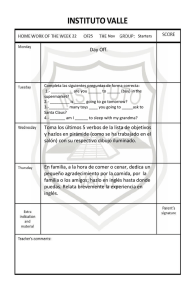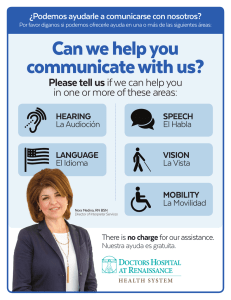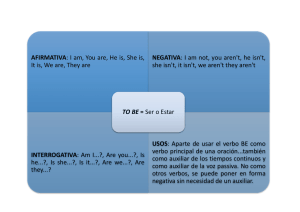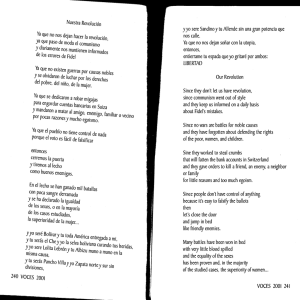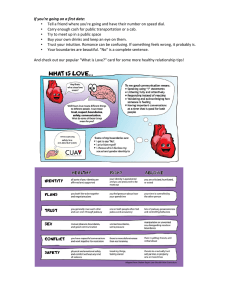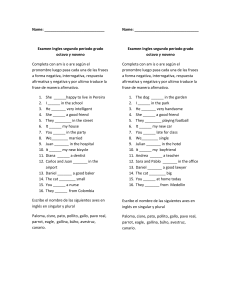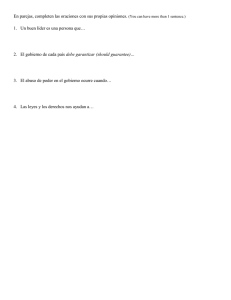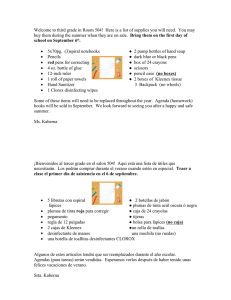Lección de gramática inglesa: Want, Would Like, Ask, Tell, Let, Make, Have
Anuncio
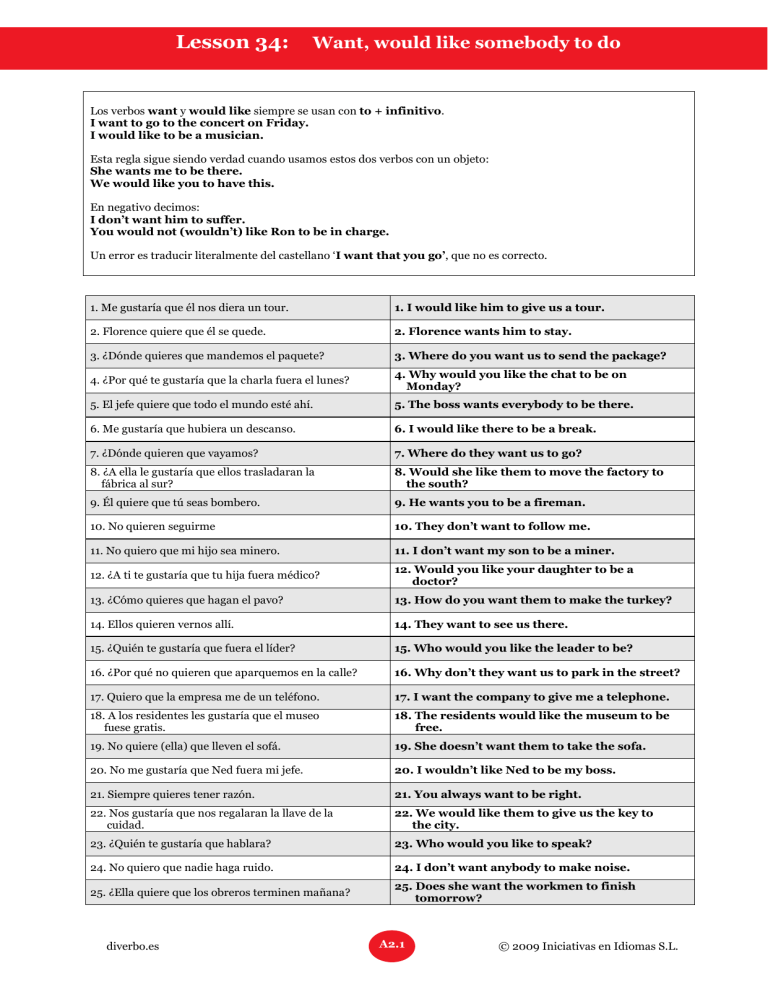
Lesson 34: Want, would like somebody to do Los verbos want y would like siempre se usan con to + infinitivo. I want to go to the concert on Friday. I would like to be a musician. Esta regla sigue siendo verdad cuando usamos estos dos verbos con un objeto: She wants me to be there. We would like you to have this. En negativo decimos: I don’t want him to suffer. You would not (wouldn’t) like Ron to be in charge. Un error es traducir literalmente del castellano ‘I want that you go’, que no es correcto. 1. Me gustaría que él nos diera un tour. 1. I would like him to give us a tour. 2. Florence quiere que él se quede. 2. Florence wants him to stay. 3. ¿Dónde quieres que mandemos el paquete? 3. Where do you want us to send the package? 4. ¿Por qué te gustaría que la charla fuera el lunes? 4. Why would you like the chat to be on Monday? 5. El jefe quiere que todo el mundo esté ahí. 5. The boss wants everybody to be there. 6. Me gustaría que hubiera un descanso. 6. I would like there to be a break. 7. ¿Dónde quieren que vayamos? 7. Where do they want us to go? 8. ¿A ella le gustaría que ellos trasladaran la fábrica al sur? 8. Would she like them to move the factory to the south? 9. Él quiere que tú seas bombero. 9. He wants you to be a fireman. 10. No quieren seguirme 10. They don’t want to follow me. 11. No quiero que mi hijo sea minero. 11. I don’t want my son to be a miner. 12. ¿A ti te gustaría que tu hija fuera médico? 12. Would you like your daughter to be a doctor? 13. ¿Cómo quieres que hagan el pavo? 13. How do you want them to make the turkey? 14. Ellos quieren vernos allí. 14. They want to see us there. 15. ¿Quién te gustaría que fuera el líder? 15. Who would you like the leader to be? 16. ¿Por qué no quieren que aparquemos en la calle? 16. Why don’t they want us to park in the street? 17. Quiero que la empresa me de un teléfono. 17. I want the company to give me a telephone. 18. A los residentes les gustaría que el museo fuese gratis. 18. The residents would like the museum to be free. 19. No quiere (ella) que lleven el sofá. 19. She doesn’t want them to take the sofa. 20. No me gustaría que Ned fuera mi jefe. 20. I wouldn’t like Ned to be my boss. 21. Siempre quieres tener razón. 21. You always want to be right. 22. Nos gustaría que nos regalaran la llave de la cuidad. 22. We would like them to give us the key to the city. 23. ¿Quién te gustaría que hablara? 23. Who would you like to speak? 24. No quiero que nadie haga ruido. 24. I don’t want anybody to make noise. 25. ¿Ella quiere que los obreros terminen mañana? 25. Does she want the workmen to finish tomorrow? diverbo.es A2.1 A2.2 © 2009 Iniciativas en Idiomas S.L. Lesson 35: Ask/ tell somebody to do / not to do Cuando ask quiere decir ‘pedir’ y tell ‘decir’ siempre van con un objeto +to +verbo en infinitivo: Ask him to drive. Pídele que conduzca. Tell them to whisper. Diles que susurren. En negativa, existen dos posibilidades: Con la negativa antes del verbo, tiene un sentido. I am not asking you to go. No te estoy pidiendo que vayas. (En este caso no opino, no digo nada al respeto.) Pero con la negativa después del verbo ask o tell tienen otro, ya que estas diciendo que no vaya. I am asking you not to go. Te estoy pidiendo que no vayas. 1. Pídele que traiga el dinero (a él). 1. Ask him to bring the money. 2. Ella siempre nos dice que trabajemos duro. 2. She always tells us to work hard. 3. Dile (a él) que no lo haga. 3. Tell him not to do it. 4. Nos piden que no llamemos durante las horas de oficina. 4. They ask us not to call during office hours. 5. ¿A quien sueles decir que vaya? 5. Who do you usually tell to go? 6. Le están diciendo que limpie su mesa. 6. They are telling him to clean his desk. 7. Siempre le pido (a él) que apague la luz. 7. I always ask him to turn off the light. 8. ¿A dónde les dices que vayan? 8. Where do you tell them to go? 9. Mis niños no piden que les compre comida basura. 9. My kids don’t ask me to buy them junk food. 10. ¿Te pide ella que lo traduzcas? 10. Does she ask you to translate it? 11. Diles que paren. 11. Tell them to stop. 12. ¿Por qué les pides que lo lleven? Diles que lo lleven. 12. Why do you ask them to take it? Tell them to take it. 13. ¿Por qué les decís que fichen? 13. Why do you tell them to punch in? (clock in) 14. Ahora nos están diciendo que no usemos Internet. 14. Now they are telling us not to use Internet. 15. Pídele que no de golpes a la mesa. (a ella) 15. Ask her not to hit the table. 16. Nunca nos dicen que pongamos las cajas en la cocina. 17. Dile que archive los documentos por orden alfabético. (a ella) 16. They never tell us to put the boxes in the kitchen. 17. Tell her to file the documents in alphabetical order. 18. ¿Qué me estas pidiendo que haga? 18. What are you asking me to do? 19. Os digo que no vengáis. 19. I’m telling you not to come. 20. ¿Por qué no les pedís que traigan el postre? 20. Why don’t you ask them to bring dessert? 21. Dígale que devuelva mi calculadora. 21. Tell him to return my calculator. 22. Normalmente nos piden que aparquemos en el callejón. 23. ¿Por qué les dices que se laven los dientes antes de la cena? 22. They normally ask us to park in the alley. 23. Why do you tell them to brush their teeth before dinner? 24. El padre de mi amigo siempre pide que cocine. 24. My friend’s father always asks me to cook. 25. Nos dicen que protejamos nuestras rodillas. 25. They tell us to protect our knees. diverbo.es A2.2 © 2009 Iniciativas en Idiomas S.L. Lesson 36: Let, make, have somebody do something Los verbos let, make y have tienen una estructura parecida a la de want, es decir siempre les sigue un infinitivo. La diferencia es que después de let, make y have viene el infinitivo sin el to. I want you to come with me. - Quiero que vengas conmigo. Pero: Let me go. - Déjame marchar. (Let se usa para permiso.) Make her clean her desk. - Haz que limpie su mesa. (Make se usa para hablar de obligar a alguien.) Have the plumber look at it. - Que se lo mire el fontanero. (Have quiere decir que pides o pagas a alguien para que hagan algo que no puedes o no quieres hacer.) 1. Déjales hablar. 1. Let them speak. 2. Haz que lo haga sola. 2. Make her do it by herself. 3. Que lo haga un mecánico. 3. Have a mechanic do it. 4. Nos están obligando a terminar la maqueta. 4. They are making us finish the model. 5. ¿Te dejan tus padres comer golosinas? 5. Do your parents let you eat candy? (sweets) 6. ¿Por qué nos obligan a cantar? 6. Why do they make us sing? 7. Déjale seguir. (a él) 7. Let him continue. 8. Nunca me dejas venir. 8. You never let me come. 9. ¿Te dejan conducir con una cerveza abierta? 9. Do they let you drive with an open beer? 10. Que lo mire un profesional. 10. Have a professional look at it. 11. No les estamos dejando pintar. 11. We are not letting them paint. 12. Haz que apague la minicadena. 12. Make him turn off the stereo. 13. ¿Qué les van a obligar traer? 13. What are they going to make them bring? 14. Déjame marchar. 14. Let me go. 15. Él le obligará a sacar la foto de nuevo. (a ella) 15. He will make her take the picture again. 16. Que corte el árbol el jardinero. 16. Have the gardener cut the tree. 17. La profesora está obligando a los niños a echarse una siesta. 17. The teacher is making the children take a nap. 18. Déjame coger dos folletos. 18. Let me take two brochures. 19. ¿Le vas a obligar a ponerse una camisa? (a él) 19. Are you going to make him put on a shirt? 20. Siempre me haces repetirme. 20. You always make me repeat myself. 21. No dejes que los niños corran en el salón. 21. Don’t let the children run in the living room. 22. Permíteme decirte una cosa. 22. Let me tell you something. 23. Que lo revise Marsha. 23. Have Marsha check it. 24. No nos dejan llevar pantalones cortos a la oficina. 24. They don’t let us wear shorts to the office. 25. ¿Por qué no le haces irse a la cama? 25. Why don’t you make him go to bed? diverbo.es A2.2 © 2009 Iniciativas en Idiomas S.L. Lesson 37: Verbs with two objects Hay ciertos verbos que llevan dos objetos, como give o show y existen dos posibles estructuras: Give me a book. Give a book to me. Si vas a sustituir el nombre con el pronombre (it singular o them plural), se diría: Give it to me. (NO give me it) Otros verbos tienen la misma estructura, pero con for en vez de to, como buy y make. Esta estrcutura se suele usar cuando se hace algo por la otra persona o en nombre de otra persona: Buy me a drink. Buy a drink for me. Buy it for me. Hay algunos verbos con dos objetos que sólo admiten una estructura: Ask me for it.- Pídemelo: (NO ask for me it NI ask it to me) Explain it to me. - Explíquemelo: (NO explain me NI explain me it) 1. Dales su carnet de identidad. 1. Give them their ID card. 2. Enséñaselo a ellos. 2. Show it to them. 3. Siempre les ofrezco una bebida. 3. I always offer them a drink. 4. Me están haciendo paella. 4. They are making paella for me. 5. Pásamelos. 5. Pass them to me. 6. Se lo estoy explicando a ellos. 6. I am explaining it to them. 7. Él les hace la comida. 7. He makes them lunch. 8. Pídeselo a ella. 8. Ask her for it. 9. Nunca nos piden los datos. 9. They never ask us for the information. 10. Préstamelo. 10. Lend it to me. 11. Nos lo mandan por fax. 11. They send it to us by fax. 12. Les compra un regalo todos los años. (ella) 12. She buys a gift for them every year. 13. Pásame la sal por favor. 13. Please pass me the salt. 14. Quiero que me enseñes las fotos. 14. I want you to show me the photos. 15. Consígueme uno. 15. Get one for me. 16. ¿Por qué se lo estás dando a ellos? 16. Why are you giving it to them? 17. ¿Qué me estás pidiendo? 17. What are you asking me for? 18. ¿Cuándo nos los dan? 18. When do they give them to us? 19. ¿Te presta dinero la empresa? 19. Does the company lend you money? 20. ¿Ofrecen a los empleados coche de empresa? 20. Do they offer the workers a company car? 21. ¿Dónde les consigues los uniformes? 21. Where do you get the uniforms for them? 22. ¿Te piden tabaco en los pubs? 22. Do they ask you for cigarettes in the pubs? 23. ¿Te lo explican ellos antes? 23. Do they explain it to you before? 24. ¿Cuándo os piden caramelos vuestros niños? 24. When do your children ask you for candy (sweets)? 25. ¿Se lo dais? 25. Do you give it to them? diverbo.es A2.2 © 2009 Iniciativas en Idiomas S.L. Lesson 38: Numbers 1, 000 – 1, 000, 000 Primero vamos a ver como decimos los miles - thousand / ¨zausnd¨ /θauznd/: 1,000 – one thousand 2,000 – two thousand 3,000 – three thousand 4,000 – four thousand 5,000 – five thousand 6,000 – six thousand 7,000 – seven thousand 8,000 – eight thousand 9,000 – nine thousand 10,000 – ten thousand 100,000 – one hundred thousand 1,000,000 – one million Al contrario que en español: - para distinguir los miles en inglés se utiliza la coma (,) – el punto (.) en inglés es decimal. También hay que recordar que: - Al igual que hundred, thousand, million siempre van en singular. - Seguimos utilizando and después de los cientos, ya sean cientos de miles o cientos de millones... Con más dígitos, se complica un poco: 1,200 = one thousand two hundred 4,320 = four thousand three hundred and twenty 7,563 = seven thousand five hundred and sixty-three 9,213 = nine thousand two hundred and thirteen 10,452 = ten thousand four hundred and fifty-two 16,963 = sixteen thousand nine hundred and sixty-three 27,111 = twenty-seven thousand one hundred and eleven 33,303 = thirty-three thousand three hundred and three 49,409 = forty-nine thousand four hundred and nine 51,702 = fifty-one thousand seven hundred and two 68,007 = sixty-eight thousand and seven 49,003 = forty-nine thousand and three 100,323 = one hundred thousand three hundred and twenty-three 200,614 = two hundred thousand six hundred and fourteen 230,793 = two hundred and thirty thousand seven hundred and ninety-three 570,821 = five hundred and seventy thousand eight hundred and twenty-one 555,555 = five hundred and fifty-five thousand five hundred and fifty-five 111,111 = one hundred and eleven thousand one hundred and eleven 1,324,546 = one million three hundred and twenty four thousand five hundred and forty-six 9,417,987 = nine million four hundred and seventeen thousand nine hundred and eighty-seven A partir del 999,999,999 en inglés no se habla de mil millones. El número mil millones (1,000,000,000) en inglés recibe el nombre de one billion tanto en EE.UU como en el Reino Unido. Y, aunque no se suela ver mucho, un trillion en inglés es 1,000,000,000,000, lo que equivale a un billón español. diverbo.es A2.2 © 2009 Iniciativas en Idiomas S.L. Lesson 39: Reflexive pronouns En español los reflexivos se usan mucho más que en inglés. Frases como ‘se me ha caído’ no existen como tal en inglés. Cuando el sujeto y el objeto son el mismo, y la acción del sujeto recae directamente sobre el objeto, se usan. Personal pronoun I you he she it they we you Reflexive pronoun myself yourself himself herself itself themselves ourselves yourselves Algunos verbos que en español son reflexivos no suelen serlo en inglés, como por ejemplo: To shave - Afeitarse To dress, to get dressed - Vestirse To wash, to wash up - Lavarse Ojo con frases como We are looking at each other. Esto no es reflexivo. Lo que quiere decir es ‘tú me miras a mí y yo a ti’. Tú y yo nos estamos mirando (each other = el uno al otro). También se usan para significar: I go to the cinema by myself.- Voy al cine solo. I do the accounting myself. - Hago la contabilidad yo mismo. 1. Me veo en las montañas este verano. 1. I see myself in the mountains this summer. 2. Mucha gente se corta cortando jamón. 2. A lot of people cut themselves cutting ham. 3. Se conocen bien. 3. They know each other well. 4. Me estoy afeitando. 4. I’m shaving. 5. Mis niños siempre se pegan. 5. My children always hit each other. 6. Él se pega a sí mismo cuando está enfadado. 6. He hits himself when he is angry. 7. Julio Iglesias se quiere mucho. 7. Julio Iglesias loves himself. 8. Creo que se da besos a sí mismo. 8. I think he kisses himself. 9. Se queman a menudo cuando cocinan. 9. They often burn themselves when they cook. 10. El perro no se pasea solo. 10. The dog doesn’t walk itself. 11. Siempre habla sola. (ella) 11. She always talks to herself. 12. Suelen hacerse daño cuando esquían. 12. They usually hurt themselves when they ski. 13. Se vende solo. 13. It sells itself. 14. Se ven a través de la ventana. 14. They see each other through the window. 15. Se están mirando en el espejo. 15. They are looking at themselves in the mirror. 16. Me voy a lavar las manos. 16. I’m going to wash my hands. 17. Sírvete tú mismo. 17. Help yourself. 18. Puede aprender por sí misma. 18. She can teach herself. 19. Mi hija va andando sola al colegio. 19. My daughter walks to school by herself. 20. Arreglan el coche ellos mismos. 20. They fix the car themselves. 21. ¿Por qué se suicida la gente? 21. Why do people kill themselves? 22. ¿Os decís que es verdad? 22. Do you tell yourselves that it’s true? 23. ¿Qué tal nos conocemos a nosotros mismos? 23. How well do we know ourselves? 24. ¿Se caen bien el uno al otro? 24. Do they like each other? 25. ¿Por qué no cree en sí misma? 25. Why doesn’t she believe in herself? diverbo.es A2.2 © 2009 Iniciativas en Idiomas S.L. Lesson 40: Both/one/either/neither; all/some/any/none Hablando de dos cosas usamos ‘both’, ‘one’ o ‘neither’. Both of them are tall. Los dos son altos. One of them is rich. Uno de ellos es rico. Neither of them is fat. Ninguno de ellos está gordo. Para tres cosas o más usamos ‘all’, ‘some’ o ‘none’. También se puede especificar la cantidad utilizando el número; ten of them, three of you…: All of us are tired. Todos estamos cansados. Some of us live near here. Algunos vivimos cerca de aquí. None of you play baseball. Ninguno de vosotros juega al béisbol. Todas las formas anteriores se pueden usar con ‘us’, ‘you’, ‘them’: Cuando preguntas por alguno/s de ellos, o utilizas un verbo en negativo, se dice ‘either’ para dos. Do either of you have a coin? ¿Alguno de vosotros (dos) tiene una moneda? I don’t want either of them. No quiero ninguno de los dos. ‘Any’ se usa para preguntar o negar con tres o más. Do any of you come by bus? Alguno de vosotros viene en autobús? I don’t want any of those magazines. No quiero ninguna de esas revistas. ¡Ojo!: ‘Either’ o ‘any’ en afirmativa significa ‘cualquiera’: Either of them is fine. Cualquiera de los dos está bien. Any of them are fine. Cualquiera de ellos está bien. 1. Ambos tienen permiso. 1. Both of them have permission. 2. Ninguno de los dos lo sabe. 2. Neither of them knows. 3. ¿Alguno de vosotros dos habla sueco? 3. Do either of you speak Swedish? 4. No me gusta ninguno de los dos. 4. I don’t like either of them. 5. Me gustan los dos. 5. I like both of them. 6. Ninguno de los dos es feo. 6. Neither of them is ugly. 7. Cualquiera de ellos (muchos) es bueno. 7. Any of them are good. 8. Ninguno de ellos está licenciado (más de dos). 8. None of them have a degree. 9. Todos nosotros vivimos cerca. 9. All of us live near here. 10. Algunos dicen que es horrible. 10. Some of them say that it’s horrible. 11. ¿Alguno de vosotros juega al voleibol? 11. Do any of you play volleyball? 12. Cualquiera de los dos funciona. 12. Either of them work. 13. Uno de ellos cuesta dinero. 13. One of them costs money. 14. ¿Alguno de ellos tiene carné de identidad? (dos personas) 14. Do either of them have ID? 15. Ninguno de los dos paga bien. 15. Neither of them pays well. 16. Dos de vosotros tienen clase. 16. Two of you have class. 17. No quiero que vengáis ninguno de vosotros. 17. I don’t want any of you to come. 18. Díselo a cualquiera. 18. Tell anybody. 19. Ambos viven en las afueras, pero ninguno viene en coche. 19. Both of them live in the outskirts, but neither of them comes by car. 20. Todos ellos beben café, pero ninguno bebe té. 20. All of them drink coffee, but none of them drink tea. 21. Ninguno de nosotros tiene tiempo. 21. None of us have time. 22. ¿Les gusta el sitio a alguno de ellos? 22. Do any of them like the place? 23. Ninguno de nosotros dos lo creemos. 23. Neither of us believes it. 24. Ninguno de ellos (varios) trae a sus niños. 24. None of them bring their kids. 25. Ambos cumplen años este mes. 25. Both of them have a birthday this month. diverbo.es A2.2 © 2009 Iniciativas en Idiomas S.L. Lesson 41: Present simple vs. present continuous Aquí hay que recordar las dos reglas básicas: I do it – lo hago (habitualmente). I am doing it – lo estoy haciendo (ahora). En español, y especialmente en interrogativa, se usa el presente simple en los dos casos: What do you do on Sundays? ¿Qué haces los domingos? (todos) What are you doing? ¿Qué haces? (ahora) 1. Voy al supermercado los viernes. 1. I go to the supermarket on Fridays. 2. Me voy al supermercado. 2. I’m going to the supermarket. 3. Estás leyendo el párrafo equivocado. 3. You are reading the wrong paragraph. 4. Siempre lee el periódico del domingo.(él) 4. He always reads the Sunday paper. 5. Mi jefe viene en tren (de manera habitual). 5. My boss comes by train. 6. Los invitados están viniendo en autobús. 6. The guests are coming by bus. 7. Alicia juega al hockey. 7. Alice plays hockey. 8. Están jugando a las cartas. 8. They are playing cards. 9. Rob trabaja hasta las siete. 9. Rob works until seven. 10. Trabaja en Bruselas esta semana. 10. He is working in Brussels this week. 11. ¿Qué haces? (¿a qué te dedicas?) 11. What do you do? 12. ¿Qué haces? (ahora) 12. What are you doing? 13. ¿Dónde vas? 13. Where are you going? 14. ¿Dónde vais en agosto? 14. Where do you go in August? 15. ¿Qué están comiendo? 15. What are they eating? 16. ¿Por qué no comen carne? 16. Why don’t they eat meat? 17. ¿Qué mira? (ella) 17. What is she looking at? 18. ¿Lleva gafas? (él) 18. Does he wear glasses? 19. ¿Las lleva puestas ahora? 19. Is he wearing them now? 20. ¿Tiene coche? (ella) 20. Does she have a car? 21. ¿Con quién está tomando un café? (ella) 21. Who is she having a coffee with? 22. ¿Crees en los fantasmas? 22. Do you believe in ghosts? 23. ¿Qué dices? 23. What are you saying? 24. ¿Qué se suele decir en esta situación? 24. What do you usually say in this situation? 25. ¿De qué está hablando ella? 25. What is she talking about? diverbo.es A2.2 © 2009 Iniciativas en Idiomas S.L. Lesson 42: Future – going to Going to se usa para un futuro ya planeado, una intención, o algo que es obvio que va a pasar. I am going to go to the Pyrenees in October. - Voy a ir a los Pirineos en octubre. (es un plan) The course is going to be difficult. – La asignatura va a ser díficil. (sé que va a ser difícil) It’s going to snow. – Va a nevar. (hace frío, hay muchas nubes, esta previsto) 1. Vamos a comprar un coche nuevo. 1. We are going to buy a new car. 2. El teatro va a estar abarrotado. 2. The theater is going to be crowded.(theatre) 3. Va a estar (ella) fuera una semana. 3. She is going to be away for a week. 4. Esta tarde va a haber una reunión. 4. There is going to be a meeting this afternoon. 5. Me voy a ir andando a la estación. 5. I am going to walk to the station. 6. Sue va a estudiar Derecho. 6. Sue is going to study law. 7. Vamos a comer fuera. 7. We are going to eat out. 8. Earl va a ir al gimnasio hoy. 8. Earl is going to go to the gym today. 9. El tráfico va a ser espantoso. 9. The traffic is going to be awful. 10. El comité va a presentar el proyecto en el hotel. 10. The committee is going to present the project at the hotel. 11. Vamos a devolver el videojuego. 11. We are going to return the video game. 12. Va a hacer frío en la estación de esquí. 12. It’s going to be cold at the ski resort. 13. La empresa va a patrocinar la carrera. 13. The company is going to sponsor the race. 14. El despertador va a sonar a las seis. 14. The alarm is going to ring at six. 15. La boda va a ser cara. (de ellos) 15. Their wedding is going to be expensive. 16. ¿Qué vas a hacer? 16. What are you going to do? 17. ¿Cuándo van a arreglarlo? 17. When are they going to fix it? 18. ¿Van a televisar el encuentro? 18. Are they going to broadcast the game? 19. ¿Por qué va a estar Paul allí? 19. Why is Paul going to be there? 20. ¿Cómo van a llevar la mesa? (lo van a hacer y te parece difícil) 20. How are they going to carry the table? 21. ¿Me vas a presentar a tu amigo/a? 21. Are you going to introduce me to your friend? 22. ¿Dónde vais a ir después del trabajo? 22. Where are you going to go after work? 23. ¿Vais a llevar a los niños? 23. Are you going to take your children? 24. ¿Quién va a quedarse en tu casa? 24. Who is going to stay at your house? 25.¿Qué se va a poner? (él) 25. What is he going to wear? diverbo.es A2.2 © 2009 Iniciativas en Idiomas S.L. Lesson 43: Percents, fractions and decimals Cuando hablamos de porcentajes en inglés, no solemos traducir el ‘un’ o ‘el’. Un 20% de los soldados viven en el cuartel. - Twenty percent of the soldiers live on the base. El 50% de las camas están vacías. - Fifty percent of the beds are empty. Las fracciones se dicen igual que en español: el número de arriba es cardinal y el de abajo ordinal. 2/3 = Two-thirds 5/8 = Five-eighths Aunque decimos: ½ = One-half Recuerda que con los números, en inglés se dice al revés: la coma es para los miles y el punto para los decimales. 1,250 = One thousand, two-hundred and fifty 1.250 = One point two, five, zero 1. Has bebido dos tercios de la botella. 1. You have drunk two-thirds of the bottle. 2. El 60% de los pensionistas viaja en autobús. 2. Sixty percent (60%) of retirees travel by bus. 3. Hay mil millones de camas en China. 3. There are a billion beds in China. 4. Casi dos millones de personas viven en Barcelona. 4. Almost two million people live in Barcelona. 5. El gas va a ser un 12% más caro. 5. Gas is going to be 12% more expensive. (petrol) 6. Dale un incremento de sueldo del 10%. 6. Give him a 10% raise. 7. Pi es 3.14 7. Pi is 3.14 8. Un cuarto de nuestros trabajadores son extranjeros. 8. A fourth of our workers are foreign. 9. Miles de coches en la cuidad están abandonados. 9. Thousands of cars in the city are abandoned. 10. Hay 6,4 mil millones de personas en el mundo. 10. There are 6.4 billion people in the World. 11. Casi un tercio viven en China y La India. 11. Almost a third (one third) live in China and India. 12. Lo voy a intentar al cien por cien. 12. I’m going to give it 100% 13. Mi hermano siempre come tres octavos de la tarta. 13. My brother always eats three-eights of the cake. 14. Eso ocurre el 99% de las veces. 14. That happens 99% of the time. 15. 0,5 es lo mismo que la mitad. 15. .5 is the same as one-half. 16. El nivel de alcohol permitido es 0,4ml. 16. The blood alcohol limit is 0.4 ml. 17. ¿Qué porcentaje de los trabajadores trabaja horas extras? 17. What percent of the workers work overtime? 18. El 30% se queda después de las 5. 18. Thirty percent stay later than 5. 19. Una quinta parte de los bultos llegan el sábado. 19. One-fifth of the packages arrive on Saturday. 20. La bolsa va a bajar 1,5%. 20. The stock market is going to go down 1.5% 21. Solo un décimo de los pájaros migra. 21. Only one-tenth of the birds migrate. 22. La mitad de la leche está mala. 22. Half of the milk is bad. 23. Es cien por cien lana. 23. It’s one hundred percent wool. 24. Un 20% de la gente contesta mal. 25. Uno de cada cuatro viene en transporte público. diverbo.es 24. Twenty percent of the people answer incorrectly. 25. One out of four comes by public transportation. A2.2 © 2009 Iniciativas en Idiomas S.L. Lesson 44: Future – will Will se usa para un futuro indeterminado o no seguro. Se emplea will si no hay un plan previo al momento de hablar o después de palabras como maybe, think y frases condicionales con if o when: I think I will (I’ll) go for a walk. She doesn’t know if she will (she´ll) buy it. If it rains, we will not (won’t) play basketball. Al hablar, normalmente utilizamos la forma abreviada: I’ll, you’ll etc… y en negativo: won’t. En inglés escrito, se contrae o no, dependiendo del grado de formalidad. Ten en cuenta que no se dice will to. 1. Creo que iré a las dos. 1. I think I will go at 2 o’clock. 2. Si veo a John, no se lo diré. 2. If I see John, I will not tell him. (won’t) 3. Cuando llegue él, empezaremos. 3. When he arrives, we will begin. (we’ll) 4. Un día de estos, tendremos una zona de descanso. 4. One day, we will have a break room. 5. No, no traeré la bebida. 5. No, I will not bring the drinks. 6. Te veo mañana. 6. I will see you tomorrow. 7. Si llueve irán en tren. 7. If it rains, they will go by train. (they’ll) 8. Si viene Paula, seremos tres. (literalmente: habrá tres de nosotros) 8. If Paula comes, there will be three of us. 9. Volveremos a las tres si terminamos las pruebas. 9. We will return at 3 o’clock if we finish the tests. 10. Ella vendrá si se lo ofreces. 10. She will come if you offer it to her. (she’ll) 11. No vendrán mañana. 11. They won’t come tomorrow. 12. Si nadie viene, me comeré toda la tarta. 12. If nobody comes, I will eat the whole cake. 13. Si ella no trabaja el domingo, iremos a Segovia. 13. If she doesn’t work on Sunday, we will go to Segovia. 14. ¿Cómo lo sabré? 14. How will I know? 15. ¿Qué harás si eso ocurre? 15. What will you do if that happens? 16. ¿Por qué no va a trabajar allí? 16. Why won’t he work there? (always won’t in the negative question) 17. Si Mike no viene, ¿quién hablará? 17. If Mike doesn’t come, who will speak? 18. ¿Jugarás esta tarde si nieva? 18. Will you play this afternoon if it snows? 19. ¿Cuándo llegará el paquete? 19. When will the package arrive? 20. ¿Quién sustituirá al jefe si está enfermo? 20. Who will substitute for the boss if he is ill? 21. Si tu equipo gana, ¿estarás contento? 21. If your team wins, will you be happy? 22. ¿Asistirás al congreso si te pagan el hotel? 22. Will you attend the convention if they pay for your hotel? 23. Si no tenemos luz, ¿comeremos fuera? 23. If we don’t have electricity, will we eat out? 24. ¿Podrás (serás capaz de) usar el futuro después de terminar esta lista? 24. Will you be able to use the future after finishing this list? 25. Will you be happy if you don’t make any mistakes? 25. ¿Estarás contento si no cometes ningún error? diverbo.es A2.2 © 2009 Iniciativas en Idiomas S.L. Lesson 45: 1st conditional – future Para hablar de una situación que sucederá en el futuro si ocurre - o no ocurre - una cosa primero, usamos el primer condicional. La frase tiene dos partes: 1. If – If it snows tomorrow 2. Will – I will come by bus. Se puede decir de dos maneras: If it snows tomorrow, I will come by bus. I will come by bus if it snows tomorrow. Después de if, nunca se dice will. 1. Si ella trae el perro, empezaré a estornudar. 1. If she brings the dog, I’ll start to sneeze. 2. Se lo diré si eso es lo que quieres. 2. I will tell him if that’s what you want. 3. ¿Se enfadará tu marido si no vienen los albañiles? 3. Will your husband be angry if the masons don’t come? (builders) 4. La gente estará mas contenta si construyen una biblioteca. 4. People will be happier if they build a library. 5. Tendrás frió en las manos si no llevas guantes. 5. Your hands will be cold if you don’t wear gloves. 6. ¿Si terminamos antes, que harás? 6. If we finish early, what will you do? 7. La abuela vendrá si la recogemos. 7. Grandma will come if we pick her up. 8. Si el pescado está fresco, no podremos olerlo desde la calle. 9. Iremos a Grecia si terminamos con el proyecto antes del verano. 8. If the fish is fresh, we won’t be able to smell it from the street. 9. We will go to Greece if we finish the project before summer. 10. ¿Que hará él si se rompe un hueso? 10. What will he do if he breaks a bone? 11. No venderemos nada si no bajamos el precio. 11. We won’t sell anything if we don’t lower the price. 12. ¿Habrá mucha gente en el comedor si comemos pronto? 12. Will there be a lot of people in the cafeteria if we eat early? (canteen) 13. Si no llamamos a la puerta, el perro no ladrará. 13. If we don’t knock on the door, the dog won’t bark. 14. ¿Dónde irán si hay un huracán? 14. Where will they go if there is a hurricane? 15. Si vamos en coche necesitaremos más tiempo. 15. If we go by car we will need more time. 16. Nos reservarán una mesa si llamamos. 16. They will reserve us a table if we call. 17. ¿Quién lo hará si no lo hace ella? 17. Who will do it if she doesn’t? 18. Apestará si abres la lata en la oficina. 18. It will smell bad if you open the tin in the office. 19. Saldrá gratis si traemos a cinco personas. 19. It will be free if we bring five people. 20. Nos darán el visado antes si pagamos más. 20. They will give us the visa sooner if we pay more. 21. No irán a cazar si hace malo. 21. If the weather is bad, they won’t go hunting. 22. Llegará tarde el autobús si para en todas las paradas. 23. ¿Jugaréis el partido si la mitad del equipo está enfermo? 24. Si sube la temperatura este sitio se convertirá en un desierto. 25. No nadaremos si no hace calor. diverbo.es 22. The bus will arrive late if it stops at all the stops. 23. Will you play the match if half the team is ill? 24. If the temperature goes up, this place will become a desert. 25. We won’t swim if it’s not hot. A2.2 © 2009 Iniciativas en Idiomas S.L. Lesson 46 & 49: Shall, can Shall se usa en primera persona del singular o pural para ofrecer, hacer o sugerir algo. Shall I open the window? - ¿Abro la ventana? Shall we go? - ¿Nos vamos? Can se usa para hablar de permiso, habilidad o para pedir que alguien haga algo. I can play the piano – Sé tocar el piano. Can I go? - ¿Me puedo ir? Can you close the door? – ¿Puedes cerrar la puerta? Recuerda que nunca se dice ni can to ni shall to. 1. No veo. 1. I can’t see. 2. Sabe hablar 5 idiomas.(ella) 2. She can speak 5 languages. 3. No puedes fumar aquí. 3. You can’t smoke here. 4. Él puede tocar la guitarra en tu aniversario. 4. He can play the guitar at your anniversary. 5. No podemos aparcar en el garaje de la empresa. 5. We can’t park in the company garage. 6. Se puede ver la Torre Eiffel desde el hotel. 6. You can see the Eiffel Tower from the hotel. 7. No pueden venir esta tarde. 7. They can’t come this afternoon. 8. Puedes coger un folleto si quieres. 8. You can take a brochure if you want. 9. Os podéis sentar. 9. You can take a seat. 10. Sé cocinar muy bien. 10. I can cook very well. 11. ¿Bailamos? 11. Shall we dance? 12. ¿Abro la ventana? 12. Shall I open the window? 13. ¿Puedes abrir la puerta? (alguien llama) 13. Can you answer the door? 14. ¿Podemos llevarnos al perro? 14. Can we take the dog? 15. ¿Por qué no podemos bañarnos en el lago? 15. Why can’t we swim in the lake? 16. ¿Sirvo la cena? 16. Shall I serve dinner? 17. ¿Puede estar aquí a las cuatro? (ella) 17. Can she be here at four? 18. ¿Dónde puedo comprar una revista de ciclismo? 18. Where can I buy a cycling magazine? 19. ¿Hacemos un picnic? 19. Shall we have a picnic? 20. ¿Cómo puedo ir de aquí al centro? 20. How can I go from here to the city center? (centre) 21. ¿Qué puedo comprarle a mi suegro? 21. What can I buy for my father-in-law? 22. ¿A quién podemos preguntar? 22. Who can we ask? 23. ¿Nos vamos? 23. Shall we go? 24. ¿Cuándo podemos empezar? 24. When can we start? 25. ¿Dónde se pueden comprar sellos? 25. Where can you buy stamps? diverbo.es A2.2 © 2009 Iniciativas en Idiomas S.L. Lesson 46 & 49: Shall, can Shall se usa en primera persona del singular o pural para ofrecer, hacer o sugerir algo. Shall I open the window? - ¿Abro la ventana? Shall we go? - ¿Nos vamos? Can se usa para hablar de permiso, habilidad o para pedir que alguien haga algo. I can play the piano – Sé tocar el piano. Can I go? - ¿Me puedo ir? Can you close the door? – ¿Puedes cerrar la puerta? Recuerda que nunca se dice ni can to ni shall to. 1. No veo. 1. I can’t see. 2. Sabe hablar 5 idiomas.(ella) 2. She can speak 5 languages. 3. No puedes fumar aquí. 3. You can’t smoke here. 4. Él puede tocar la guitarra en tu aniversario. 4. He can play the guitar at your anniversary. 5. No podemos aparcar en el garaje de la empresa. 5. We can’t park in the company garage. 6. Se puede ver la Torre Eiffel desde el hotel. 6. You can see the Eiffel Tower from the hotel. 7. No pueden venir esta tarde. 7. They can’t come this afternoon. 8. Puedes coger un folleto si quieres. 8. You can take a brochure if you want. 9. Os podéis sentar. 9. You can take a seat. 10. Sé cocinar muy bien. 10. I can cook very well. 11. ¿Bailamos? 11. Shall we dance? 12. ¿Abro la ventana? 12. Shall I open the window? 13. ¿Puedes abrir la puerta? (alguien llama) 13. Can you answer the door? 14. ¿Podemos llevarnos al perro? 14. Can we take the dog? 15. ¿Por qué no podemos bañarnos en el lago? 15. Why can’t we swim in the lake? 16. ¿Sirvo la cena? 16. Shall I serve dinner? 17. ¿Puede estar aquí a las cuatro? (ella) 17. Can she be here at four? 18. ¿Dónde puedo comprar una revista de ciclismo? 18. Where can I buy a cycling magazine? 19. ¿Hacemos un picnic? 19. Shall we have a picnic? 20. ¿Cómo puedo ir de aquí al centro? 20. How can I go from here to the city center? (centre) 21. ¿Qué puedo comprarle a mi suegro? 21. What can I buy for my father-in-law? 22. ¿A quién podemos preguntar? 22. Who can we ask? 23. ¿Nos vamos? 23. Shall we go? 24. ¿Cuándo podemos empezar? 24. When can we start? 25. ¿Dónde se pueden comprar sellos? 25. Where can you buy stamps? diverbo.es A2.2 © 2009 Iniciativas en Idiomas S.L. Lesson 47: Will vs. going to Will se usa para un futuro no seguro: Perhaps it will get here tomorrow. - Quizás llegue mañana. If I buy one, I’ll give you my old one. – Si compro uno, te daré el viejo. Y para decisiones tomadas en el momento: Yes, I’ll go. – Si, iré. [acabo de decidir ir] También se usa para ofrecer o pedir ayuda, o ofrecerse a hacer: Will you open the door for me? – ¿Me abres la puerta? I’ll call the plumber for you. - Yo llamaré al fontanero por ti. Going to es para un futuro ya decidido o algo inminente. I’m going to go to Vienna next month. – Voy a ir a Viena el mes que viene. It’s going to rain. – Va a llover. (Hay nubes negras, la previsión es de lluvia, estamos en Galicia en noviembre) 1. Voy a comer con mi madre mañana. 1. I’m going to have lunch with my mother tomorrow. 2. El jefe no va a venir a la reunión. 2. The boss isn’t going to come to the meeting. 3. Estoy seguro que será genial. 3. I’m sure it will be great. 4. Lo haré yo. 4. I’ll do it. 5. John cree que suspenderá el examen. 5. John thinks he’ll fail the exam. 6. Vamos a hacer vela en Semana Santa. 6. We are going to go sailing at Easter. 7. Ella no va a ir a la playa el fin de semana que viene. 7. She isn’t going to go to the beach next weekend. 8. Voy a asistir a un curso el mes que viene. 8. I’m going to attend a course next month. 9. Volveré más tarde. 9. I’ll be back later. 11. Mandy me va a mandar un e-mail para confirmar las fechas. 10. We aren’t going to go to Italy with our class. 11. Mandy’s going to send me an email to confirm the dates. 12. Se lo pasarán fenomenal en Acapulco. 12. They’ll have a great time in Acapulco. 13. No te arrepentirás de tu decisión. 13. You won’t regret your decision. 14. Voy a jugar al tenis con Fred esta tarde. 14. I’m going to play tennis with Fred this afternoon. 15. ¿Va a haber comida gratis en la feria? 15. Is there going to be free food at the fair? 16. ¿Crees que vendrán? 16. Do you think they’ll come? 17. ¿Se pondrá enfermo si come más? 17. Will he get sick if he eats more? 18. ¿Por qué no se van a quedar para la segunda película? 18. Why aren’t they going to stay for the second film? 19. ¿Encontrará al asesino el detective? 19. Will the detective find the murderer? 20. ¿Cuando vamos a ver los planos? 20. When are we going to see the blueprints? 10. No vamos a ir a Italia con nuestra clase. 21. What is Faye going to wear to the wedding? 22. Why aren’t you going to complain about that? 21. ¿Qué se va a poner Faye para la boda? 22. ¿Por qué no te vas a quejar sobre eso? 23. ¿Me ayudarás si tienes tiempo? 23. Will you help me if you have time? 24. ¿Va a empezar Sarah su clase de yoga mañana? 25. ¿Por qué no habrá un intermedio? diverbo.es 24. Is Sarah going to start her yoga class tomorrow? 25. Why won’t there be an intermission? (interval) A2.2 © 2009 Iniciativas en Idiomas S.L. Lesson 48: Future: all forms Ya hemos visto cuando se usa will y going to para el futuro. Pero, hay otras dos formas que se utilizan para expresar el futuro. El present continous – I am doing - se usa para hablar de cosas programadas en el futuro, cosas en tu agenda. I’m meeting with the General Manager tomorrow. - Me voy a reunir con el director general mañana. También se puede decir: I am going to meet him tomorrow. El present simple – I do it- se usa para hablar de horarios en el futuro. The train leaves at 6 tomorrow. El tren sale a las 6 mañana. 1. El autocar a Almería sale a las 8 y a las 10. 1. The bus to Almeria leaves at 8 and 10. 2. Voy a comer con el vicepresidente mañana. 2. I’m eating with the Vice President tomorrow. 3. ¿Qué ocurrirá si el perro se escapa de nuevo? 3. What will happen if the dog escapes again? 4. Sí, iré a la fiesta. 4. Yes, I’ll go to the party. 5. Va a caer un chaparrón. 5. There’s going to be a downpour. 6. El tren llegará a las 6. 6. The train arrives at 6. 7. Voy a ver a mi contable mañana. 7. I’m going to see my accountant tomorrow. 8. Ella vuela a Estocolmo mañana. 8. She is flying to Stockholm tomorrow. 9. ¿Te veo mañana? 9. Will I see you tomorrow? 10. Las rebajas van a ser muy caóticas. 10. The sales are going to be chaotic. 11. Si le traes, no te dejarán entrar. 11. If you bring him, they won’t let you in. 12. No podemos ir por allí por que se subirá el puente a las 3:30. 12. We can’t go that way because the bridge goes up at 3:30. 13. ¿Qué vas a contarles? 13. What are you going to tell them? 14. Si me escuchan, les diré lo que quieren oír. 14. If they listen to me, I’ll tell them what they want to hear. 15. No te preocupes, lo hará Raymond. 15. Don’t worry, Raymond will do it. 16. ¿Cuántos invitados va a haber? 16. How many guests are there going to be? 17. Mañana tomo café con el coronel. 17. I’m having coffee with the colonel tomorrow. 18. ¿Cuándo traerán los muebles? 18. When will they bring the furniture? 19. No habrá nadie aquí si vienen el domingo. 19. Nobody will be here if they come on Sunday. 20. Van a traer a su hermanastro. 20. They are going to bring their half-brother. 21. Les vamos a recoger en el aeropuerto mañana. 21. We’re picking them up at the airport tomorrow. 22. ¿Te vas a la cama? 22. Are you going to bed? 23. La película empieza a las nueve. 23. The movie starts at 9. (film) 24. Te veo allí. 24. I’ll see you there. 25. Nos vamos a ver el sábado. 25. We’re going to see each other this Saturday. diverbo.es A2.2 © 2009 Iniciativas en Idiomas S.L. Lesson 50: Know how to Para decir ‘saber hacer’ en inglés, decimos know how to. ¿Sabes tocar la guitarra? – Do you know how to play the guitar? Un error muy común es omitir how. 1. Sé conducir un coche de marchas. 1. I know how to drive a stick-shift. (manual) 2. Todo el mundo en esta oficina sabe hablar inglés. 2. Everyone in this office knows how to speak English. 3. No one in my class knows how to fly an airplane. 3. Nadie en mi clase sabe pilotar un avión. 4. El niño sabe atarse los zapatos. 4. The boy knows how to tie his shoes. 5. No sé tocar el piano. 5. I don’t know how to play the piano. 6. Martha no sabe usar el ordenador. 6. Martha doesn’t know how to use the computer. 7. Tú sabes hacer una paella. 7. You know how to make a paella. 8. Su jefe no sabe dirigir a los vendedores. (de ellos) 8. Their boss doesn’t know how to manage the salespeople. 9. Los políticos saben mentir muy bien. 9. Politicians know how to lie very well. 10. Harry no sabe tratar bien a sus invitados. 11. Alguien en mi edificio sabe tocar el saxofón. 10. Harry doesn’t know how to treat his guests. 11. Someone in my building knows how to play the saxophone. 12. ¿Quién sabe apagar la alarma? 12. Who knows how to turn off the alarm? 13. Mi novio sólo sabe cocinar con microondas. 13. My boyfriend only knows how to cook with a microwave. 14. Mr. Smith sabe escribir haikus. 14. Mr. Smith knows how to write haikus. 15. Ellos saben llegar a mi casa. 15. They know how to get to my house. 17. ¿Alguien en la oficina sabe arreglar la impresora? 16. I don’t know how to program the VCR.(programme) 17. Does anyone in the office know how to fix the printer? 18. ¿Sabes bailar? 18. Do you know how to dance? 19. ¿Sabe (él) hacer una bufanda? 19. Does he know how to make a scarf? 20. No se como usar palillos chinos. 20. I don’t know how to use chopsticks. 21. ¿Sabeis jugar al ajedrez? 21. Do you know how to play chess? 22. ¿Sabe (ella) poner la mesa? 22. Does she know how to set the table? 23. ¿Alguien sabe leer japonés? 23. Does anyone know how to read Japanese? 24. ¿Sabes llegar a la Calle Sésamo? 24. Do you know how to get to Sesame Street? 25. ¿Saben decir la hora los niños? 25. Do the children know how to tell time? 16. No sé programar el vídeo. diverbo.es A2.2 © 2009 Iniciativas en Idiomas S.L. Lesson 51: Simple past - was/were, to be born El pasado del verbo to be es el único en el pasado que tiene dos formas según la persona a que se refiere: I was He/She was It was They were We were You were El negativo se forma con not. She was not here last night. She wasn’t here last night. They were not hungry. They weren’t hungry. Para hacer la pregunta, el sujeto y was o were cambian de sitio. She was ill. Was she ill? 1. ¿Por qué estaba delante de la puerta? 1. Why was it in front of the door? 2. Ellos tenían mucho frío en el teatro. 2. They were very cold in the theater. (theatre) 3. ¿Dónde estuvieron en semana santa? 3. Where were they during Easter? 4. ¿Estábais enfermos? 4. Were you ill? 5. Ella estaba de baja la semana pasada. 5. She was on leave last week. 6. Hubo mucho ruido en la plaza 6. There was a lot of noise in the square. 7. Cuando nací mis padres eran granjeros pobres 7. When I was born my parents were poor farmers. 8. ¿Dónde estaban los archivos? 8. Where were the files? 9. Los fuegos artificiales fueron espectaculares. 9. The fireworks were spectacular. 10. Teníamos hambre antes de la cena. 10. We were hungry before dinner. 11. Cuando era joven, los bollos eran baratos. 11. When I was young, pastries were cheap. 12. Y también eran más naturales. 12. They were also more natural. 13. ¿Por qué no estaba Brian en la reunión? 13. Why wasn’t Brian at the meeting? 14. El autobús llegó tarde. 14. The bus was late. 15. El torneo de poker fue un éxito. 15. The poker tournament was a success. 16. ¿Dónde naciste? 16. Where were you born? 17. La noche ha sido larga. 17. The night was long. 18. El partido fue aburrido. 18. The game was boring. 19. ¿Qué tal estaba él? 19. How was he? 20. ¿Era Valladolid la capital de España? 20. Was Valladolid the capital of Spain? 21. Estuvieron en Croacia el verano pasado. 21. They were in Croatia last summer. 22. Él era piloto cuando yo era joven. 22. He was a pilot when I was young. 23. Estaban enfadados ayer. 23. They were angry yesterday. 24. Nací en una isla. 24. I was born on an island. 25. Estuve en la calle durante el desfile. 25. I was on the street during the parade. diverbo.es A2.2 © 2009 Iniciativas en Idiomas S.L. Lesson 52: Past simple – regular verbs Los verbos regulares terminan en -ed. En afirmativo, hay que hacer hincapié en la pronunciación. Si la palabra termina en t , te, d o de, se pronuncia como el nombre Ted o la palabra dead. Wanted [uan-ted]. Ended [en-ded]. En todos los demás casos se pronuncia como una “t” o una “d” suave. asked [askt] pushed [pusht] played [pleid] El negativo se forma con did not / didn’t. Cuando se usa didn’t el verbo es en infinitivo sin to: We didn’t receive any notification. They didn’t push the car. Para formular una pregunta, usamos did con el verbo también en infinitivo: Why did you carry the cart? When did she close the window? 1. Comprobaron el documento tres veces. 1. They checked the document three times. 2. El conductor empujó la silla de ruedas de mi abuelo. 2. The driver pushed my grandfather’s wheelchair. 3. Bailamos toda la noche. 3. We danced all night. 4. Recibimos tres envíos anteayer. 4. We received three shipments the day before yesterday. 5. Aparqué en la calle. 5. I parked in the street. 6. Cuando era joven, quería un perro. 6. When I was young, I wanted a dog. 8. El partido finalizó cuando George decidió irse a casa. 7. I traveled on a ship, but I didn’t visit Alexandria. (travelled) 8. The game ended when George decided to go home. 9. No comencé porque no había papel. 9. I didn’t start because there wasn’t any paper. 10. Jugamos al ajedrez y luego pedimos una baraja de cartas. 10. We played chess and then we asked for a deck of cards. 11. Probé la sopa, pero no probé la tarta. 11. I tried the soup, but I didn’t try the cake. 12. Solicité el trabajo el martes. 12. I applied for the job on Tuesday. 13. Un español inventó la fregona. 13. A Spaniard invented the mop. 14. Hablamos de eso anoche. 14. We talked about that last night. 15. Nos sirvieron el segundo plato primero. 15. They served us the second course first. 16. Chocó contra un árbol. (él) 16. He crashed into a tree. 17. Su perro me atacó. (de ellos) 17. Their dog attacked me. 18. Gaudí nunca terminó su catedral. 18. Gaudi never finished his cathedral. 19. Gastaron todo el combustible. 19. They used all the fuel. 20. El paquete incluyó todos los traslados. 20. The package included all of the transfers. 21. ¿Por qué necesitaban catorce bastones? 21. Why did they need fourteen canes? 22. ¿Descansasteis más de lo que descansamos? 22. Did you rest longer than we rested? 23. ¿Imprimiste los documentos que yo quería? 23. Did you print the documents that I wanted? 24. ¿Volvisteis por la autopista? 24. Did you return on the highway? (motorway) 25. ¿Cuántas veces lo intentaste? 25. How many times did you try? 7. Viajé en barco, pero no visité Alejandría. www.morethanenglish.com A2.2 © 2009 Iniciativas en Idiomas S.L. Lesson 53: Past simple – irregular verbs Aquí tienes algunos de los verbos irregulares más comunes. Recuerda que sólo se usa esta forma en afirmativo. Did you go? No, I didn’t go. Yes, I went. El único secreto para aprenderse los verbos irregular es estudiarlos y practicarlos! 1. Vino el lunes, pero no vino ayer. (ella) 1. She came on Monday, but she didn’t come yesterday. 2. Me rompí la pierna practicando judo. 2. I broke my leg doing judo. 3. I caught the bus, but I didn’t catch it at the station. 4. We bought the meat where you bought the ham. 5. He cut himself and then he burned himself. (burnt) 3. Cogí el autobús, pero no lo cogí en la estación. 4. Compramos la carne donde comprasteis el jamón. 5. Se cortó y luego se quemó. (él) 6. Bebiste la cerveza que trajo (él). 6. You drank the beer that he brought. 8. Comieron todo el cocido y se encontraron mal por la noche. 7. I drove the Ferrari, but I didn’t drive the tractor. 8. They ate all of the stew and they felt bad later that night. 9. Rompí la impresora cuando le di un golpe. 9. I broke the printer when I hit it. 10. El estante se cayó por el peso. 10. The shelf fell because of the weight. 11. Volé a Nápoles y luego fui al hotel en taxi. 11. I flew to Naples and then went to the hotel by taxi. 12. ¡Olvidaste el cumpleaños de tu madre! 12. You forgot your mom’s birthday! (mum’s) 13. Él lo consiguió, me lo dio, y lo perdí. 13. He got it, gave it to me and I lost it. 7. Conduje el Ferrari, pero no el tractor. 14. We had coffee and the cookies that you made. 15. We went out last night and I met your brother-in-law. 14. Tomamos café y las galletas que hiciste. 15. Salimos anoche y conocí a tu cuñado. 16. Me pagaron en metálico. 16. They paid me in cash. 18. Durmió en el sofá porque se gastó todo su dinero. (de ellos) 17. I read the paper on the subway. (underground) 18. He slept on the sofa because he spent all of their money. 19. Hablé con él y me lo dijo. 19. I spoke to him and he told me. 20. Ella me enseñó lo que pensaba que estaba bien. 20. She taught me what she thought was right. 21. Tomó la pastilla y se despertó al día siguiente. (él) 21. He took the pill and woke up the next day. 22. Tiraste mis viejas deportivas. 22. You threw away my old sneakers. (trainers) 23. Hemmingway escribió Fiesta después de correr un encierro. 23. Hemmingway wrote Fiesta after he ran with the bulls. 24. Llevé chanclas al concierto. 24. I wore flip-flops to the concert. 25. Me levanté tarde porque mi equipo ganó el trofeo. 25. I woke up late because my team won the trophy. 17. Leí el periódico en el metro. www.morethanenglish.com A2.2 © 2009 Iniciativas en Idiomas S.L.
